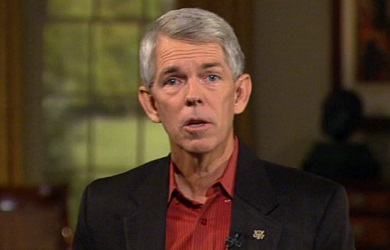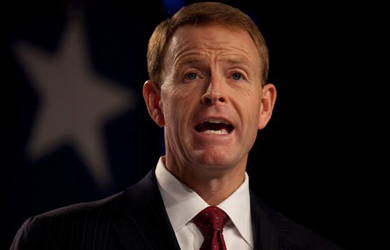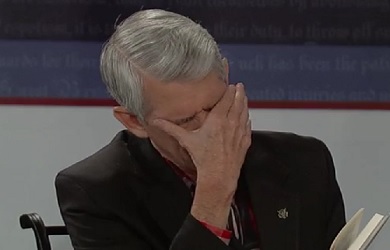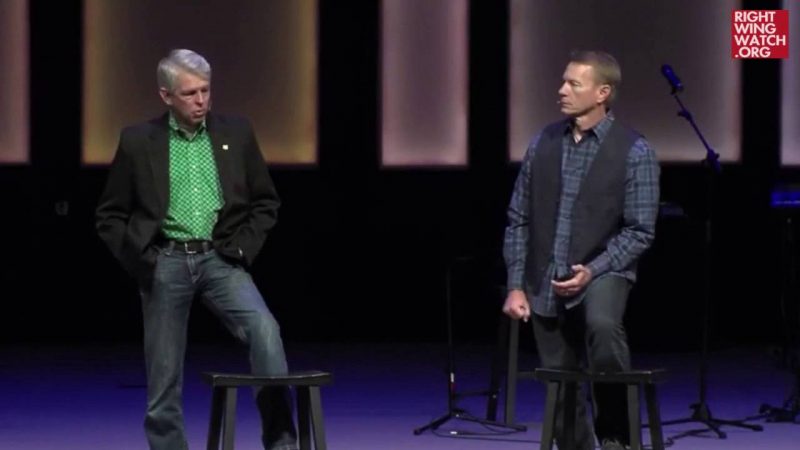During Monday and Tuesday’s Republican platform committee deliberations, an already right-wing draft was pushed even further to the right by activists on the platform committee. But now Religious Right activist David Barton and other delegates are complaining that they were duped by pro-LGBT activists into signing a minority report that could force a floor vote on replacing the entire platform with a much shorter statement of principles.
Through endless hours of amendments — some substantive and some petty wordsmithing — attempts by libertarian-leaning delegates to introduce more moderate language on LGBT equality, the drug war and other issues were routinely voted down, even an amendment that would have acknowledged the LGBT victims of ISIS terror.
Throughout the grueling process, a few delegates repeatedly complained that the platform should be seen as a vehicle for marketing Republican Party principles, and should not be something so long and so deep in the weeds on policy disputes that nobody will bother reading it. One of those voices was Utah’s Boyd Matheson, who had proposed an alternative approach that would simply lay out a set of principles, based on the platform on which Abraham Lincoln ran for the presidency in 1860.
That could have saved everyone a lot of time, but the committee didn’t go for it. The committee wrapped up its deliberations on Tuesday evening, voting to approve the amended draft, which will get final up-or-down approval by the committee on Monday before going to the convention as a whole for approval.
But that’s not the end of the story, because 37 delegates signed a “minority report,” which The Dallas Morning News’ Lauren McGaughy describes as “a sort of petition by those who couldn’t muster a majority for their proposals.”
“In this case,” McGaughy writes, “it supports doing away with the whole platform and replacing it with something shorter and simpler.” Among those who signed the petition were Matheson and Barton, the Religious Right activist who played an active role in shaping this year’s platform as well as the 2012 version.
Now, however, Matheson and Barton are among those claiming that they were “duped by a group of pro-gay rights delegates” into signing something that could be a source of division on the floor of the convention:
Boyd Matheson of Utah wrote the language in the minority report, but he said he did not support doing away with the whole platform and replacing it with his mission statement. In fact, he withdrew support of his own proposal Tuesday afternoon amid the fight.
“A minority report is a divisive issue that some people are trying to use to air their issues on the floor for the convention,” Matheson said late Tuesday.
David Barton, a Texas delegate who helped him edit the language, went a step further, saying “someone hijacked the process.”
He added: “It looks to us like they created a controversy.”
Matheson and Barton allege that a group of LGBT-friendly Republicans who had tried — unsuccessfully — to include some positive mention of the gay community in the party’s platform was behind the scheme.
The two said they would send an email to the other 35 delegates who also signed the report on Wednesday morning saying just this. Texas’ other platform committee delegate, Diana Denman, also signed the minority report, and expressed her interest in removing her name.
Other delegates suggest that Barton and Matheson knew exactly what they were signing but “got cold feet afterward when they feared being associated with a gay rights push.”
Family Research Council Action, whose leader Tony Perkins was another active member of the platform committee, pushed out an alert yesterday warning that LGBT activists were attempting to “hijack” the platform.
Perkins and the Family Research Council are delighted with the far-right platform, saying the GOP’s support for “traditional family values” is “stronger than ever.”
In another message to FRC supporters yesterday, Perkins celebrated the Religious Right’s platform victories:
I am very happy to say that the final platform document overwhelmingly approved by the delegates may be the strongest statement of conservative principles by a GOP platform to date. As Gayle Rozika, a Utah delegate for whom this was the 6th platform, told me this is the most conservative platform in her experience. Her efforts, along with those of delegates like Carolyn McLarty (Okla.), Len Munsil (Ariz.), David Barton (Texas), Jim and Judy Carns (Ala.), Kris Kobach (Kan.), Sandy McDade (La.) and a host of other conservative leaders were effective in ensuring the GOP platform provides a clear and compelling understanding of the core conservative principles that those associated with the Republican party prioritize and pursue.
Our coalition of delegates — including FRC Action and other groups like the March for Life Action, Eagle Forum, and Concerned Women for America — proved invaluable. The platform is an important document, showing the Party of Lincoln continues to respect freedom, and the rule of law, the idea that all humans deserve respect, not because of some category, but because we have inherent dignity and are made in the image of our Creator. The platform is a useful document — a standard for the party in local, state, and federal elections, use in town halls, and it provides standards to which we should hold our elected officials. Platform Chairman Senator John Barrasso (R-Wyo.), led by co-chairs Rep. Virginia Foxx (R-Va.) and Governor Mary Falin (R-Okla.) all did an excellent job allowing delegates to offer amendments and debate the issues with sincerity and respect. They deserve much respect for their efforts.








